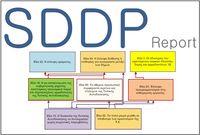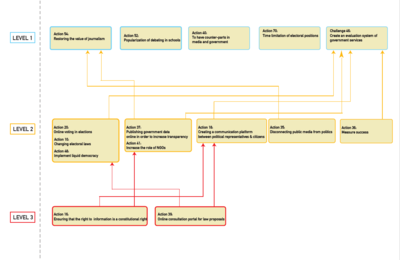SDDP Reinventing Democracy - Actions (European Initiative): Difference between revisions
No edit summary |
No edit summary |
||
| Line 19: | Line 19: | ||
|total_duration=737 person hrs | |total_duration=737 person hrs | ||
|stats=Participants=20 <br> Number of ideas=53 <br>Number of Clusters=7 <br> Ideas received Votes=42 <br> Ideas on MAP R=26 <br>Spreathink ST=20.5% <br>Situational Complexity SCI= 12.98 | |stats=Participants=20 <br> Number of ideas=53 <br>Number of Clusters=7 <br> Ideas received Votes=42 <br> Ideas on MAP R=26 <br>Spreathink ST=20.5% <br>Situational Complexity SCI= 12.98 | ||
|dates= | |dates= 8 - 12 February 2016 | ||
|link=[http://reinventdemocracy.info/w/index.php?title=Main_Page] | |link=[http://reinventdemocracy.info/w/index.php?title=Main_Page] | ||
}} | }} | ||
| Line 38: | Line 38: | ||
'''"What concrete action, project or product would you propose to solve a particular shortcoming of current systems of governance?"''' | '''"What concrete action, project or product would you propose to solve a particular shortcoming of current systems of governance?"''' | ||
In response to the TQ, the | In response to the TQ, the 20 participants came up with 57 characteristics, which were categorized in 7 clusters. Following the voting process, 38 ideas received one or more votes and were structured to create the influence MAP shown below. <br> | ||
<br> | <br> | ||
[[File: | [[File:RD EU Actions.png|thumbnail|center|400px|alt=Influence Map.|Influence tree from the Characteristics SDDP of the Reinventing Democracy workshop for TQ]] | ||
<br> | <br> | ||
Revision as of 04:03, 12 July 2016
|
Executive Summary
This paper reports the results of the second of a series of workshops organized by Future Worlds Center under the auspices of UNDEF. The dialogue was implemented in the context of the Reinventing Democracy in the Digital Era (UNDEF) project. The purpose of this project was to bring together young people from all aroud the world in an attempt to take apart and reconstruct the concept of democracy. The workshop was organized using the structured dialogic design process (SDDP) approach within the context of a rich web-based communication environment. This Co-Laboratoty was organized using the Structured Democratic Dialogue Process (SDDP) approach within the context of a rich web-based communication environment. It is organized by European Initiative.
The Triggering Question (TQ) was
"What concrete action, project or product would you propose to solve a particular shortcoming of current systems of governance?"
In response to the TQ, the 20 participants came up with 57 characteristics, which were categorized in 7 clusters. Following the voting process, 38 ideas received one or more votes and were structured to create the influence MAP shown below.
According to the participants of this workshop, appear to be the most influential were:
- Action Plan 26, Engage legal practitioners and experts to come out with an extensive legal framework on the right to information.
- Action Plan 18, Economic empowerment of the less advantaged.
Gallery
<gallery mode="packed-hover">

